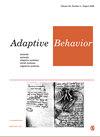通过时间反向传播训练的最小“功能敏感”生物体
IF 1.3
4区 计算机科学
Q4 COMPUTER SCIENCE, ARTIFICIAL INTELLIGENCE
引用次数: 0
摘要
这篇文章提出了一个场景,一个简单的模拟生物必须探索和利用一个包含食物堆的环境。生物体学会观察环境,用记忆来记录这些观察结果,从而计划和导航到食物密度最大的地区。我们将不同的强化学习算法与自适应动态规划算法进行了比较,并得出结论:随着时间的推移,反向传播可以令人信服地解决这一循环神经网络挑战。此外,我们认为该算法成功地模仿了最小的“功能感知”生物体的基本目标和心理环境映射技能,同时寻找在环境中静态或随机分布的食物堆。本文章由计算机程序翻译,如有差异,请以英文原文为准。
A Minimal “Functionally Sentient” Organism Trained With Backpropagation Through Time
This article presents a scenario where a simple simulated organism must explore and exploit an environment containing a food pile. The organism learns to make observations of the environment, use memory to record those observations, and thus plan and navigate to the regions with the strongest food density. We compare different reinforcement learning algorithms with an adaptive dynamic programming algorithm and conclude that backpropagation through time can convincingly solve this recurrent neural-network challenge. Furthermore, we argue that this algorithm successfully mimics a minimal ‘functionally sentient’ organism’s fundamental objectives and mental environmental-mapping skills while seeking a food pile distributed statically or randomly in an environment.
求助全文
通过发布文献求助,成功后即可免费获取论文全文。
去求助
来源期刊

Adaptive Behavior
工程技术-计算机:人工智能
CiteScore
4.30
自引率
18.80%
发文量
34
审稿时长
>12 weeks
期刊介绍:
_Adaptive Behavior_ publishes articles on adaptive behaviour in living organisms and autonomous artificial systems. The official journal of the _International Society of Adaptive Behavior_, _Adaptive Behavior_, addresses topics such as perception and motor control, embodied cognition, learning and evolution, neural mechanisms, artificial intelligence, behavioral sequences, motivation and emotion, characterization of environments, decision making, collective and social behavior, navigation, foraging, communication and signalling.
Print ISSN: 1059-7123
 求助内容:
求助内容: 应助结果提醒方式:
应助结果提醒方式:


